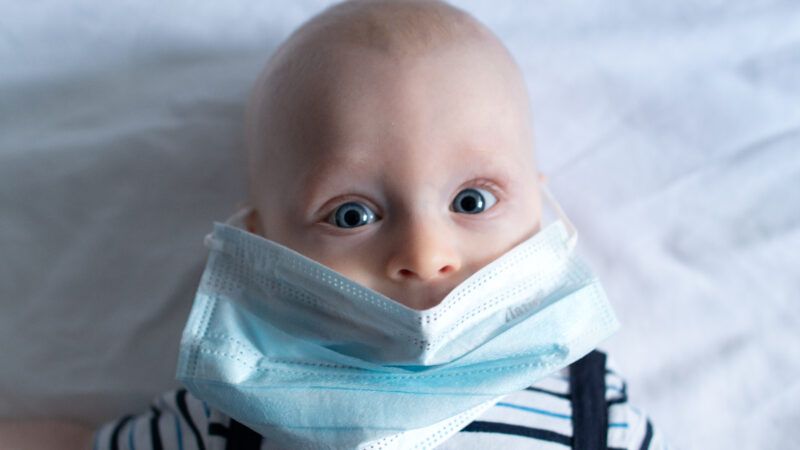Pandemic Restrictions May Harm Infants' Cognitive Development, New Study Finds
But contrary to media reports, there's no specific evidence that masks are the culprit.

COVID-19 mitigation policies like masks, social distancing, lockdowns, and school closures may have harmed the cognitive development of infants: Verbal, non-verbal, and early learning scores dropped among babies born during the pandemic, according to a new study from Brown University.
"We find that children born during the pandemic have significantly reduced verbal, motor, and overall cognitive performance compared to children born pre-pandemic," wrote the study's authors. "Results highlight that even in the absence of direct SARS-CoV-2 infection and COVID-19 illness, the environmental changes associated with the COVID-19 pandemic is significantly and negatively affecting infant and child development."
Outcomes were worse for males than females, and children in lower socioeconomic households were worst off.
The study has not yet been peer-reviewed, and it has several limitations. Researchers gathered data on 118 children born during the pandemic and compared their cognitive outcomes to a dataset that included 605 kids who were between the ages of 3 months and 3 years in the 2011 to 2020 period. While the pandemic may feel as if it has gone on forever, it's actually only been 20 months, which is not a lot of time for a newborn to develop sufficiently testable skills. Sean Deoni, an associate professor at Brown and one of the study's authors, cautioned that the findings should not be generalized to all kids.
"I think only time will tell if we see prolonged effects, or if this is transient and they recover or normalize as they get older; and if it impacts more 'mature' skills like executive functions and social skills," he tells Reason.
The Daily Mail's report on the study emphasized the possibility that face masks were responsible for the measured cognitive decline, though none of the kids in the pandemic dataset are old enough to be covered by mask mandates.
"I did not speak with the reporter/writer from the Daily Mail, and I don't agree with the rather sensationalized headline that masks are doing harm to our kiddos," he says. "Indeed, we were not able to directly test whether the trends we observed were due to mask wearing, or other potential environmental factors. The best we can say is that we are observing that children have reduced development relative to children we have tested previously."
Deoni pointed out that the largest reductions were in the categories of motor skills and language skills, which may indicate other mitigation efforts, such as social distancing, as likelier culprits.
Still, this pandemic-era drop in cognitive outcomes is notable. And even if the harms end up being smaller than they appear in this study, it's worth keeping in mind that the benefits of COVID-19 restrictions are extremely limited for this age cohort. Due to the virus's age discrimination, young people were almost entirely spared from negative health outcomes relating to the disease itself. Only about 500 children in the U.S. have died of COVID-19, and it is likely that a significant number of those victims had other health problems or compromised immune systems. For the overwhelming majority of healthy kids, there is no good evidence that they should have to wear masks, practice social distancing, and frequently miss school.
Yet in much of the country, the restrictions on young people are currently more stringent than the restrictions on adults and the elderly. In large Democratic cities like New York City and Washington, D.C., schoolchildren are generally masked. And when it's time to eat lunch, they do so outdoors—even as the weather grows colder.
Having to eat lunch outside in the cold is a punishment currently endured by school kids, and only school kids. Adults are eating indoors at restaurants and drinking indoors at bars. Now that D.C.'s mask mandate has ended, indoor gyms can once again let their customers go maskless—but in many places, masks are still required for indoor school sports. It doesn't make any sense that authorities are enforcing the harshest restrictions on the least at-risk people.
The rules for the college-aged are, if anything, even more extreme: Many campuses severely limit interactions between students, require masks even outside, and discourage nearly all forms of socialization. What's occurring is something close to the exact opposite of the ideal: Whatever mitigation policies are in place for adults and the elderly, the policies for young people should be less restrictive, not more.


Show Comments (59)